In a controversial move, the Florida legislature passed a bill on Friday that prohibits local jurisdictions from enacting regulations aimed at safeguarding outdoor workers from extreme heat, drawing condemnation from advocates who denounce the decision as detrimental to the well-being of vulnerable laborers.

Backlash and Advocacy Efforts
The newly approved legislation, which precludes cities, counties, and municipalities from implementing measures to protect outdoor workers, has elicited strong criticism from various quarters. Advocates argue that the move disregards the safety and health of approximately 2 million outdoor workers in Florida, particularly in industries such as construction and agriculture, where the risk of heat-related illnesses is pronounced.
Oscar Londoño, the executive director of the worker advocacy group WeCount!, lambasted the legislation as “cruel,” asserting that it perpetuates perilous labor conditions for some of the state’s most vulnerable workers. Despite mounting opposition, efforts to enact local heat protection ordinances, such as the proposed Miami-Dade heat ordinance, have been stymied by industry opposition and legislative maneuvering.
Gaps in Federal Oversight and State-Level Responses
The absence of federal standards to safeguard outdoor workers from heat-related hazards exacerbates the urgency for state and local governments to take proactive measures. Although the Biden administration directed the Occupational Safety and Health Administration (OSHA) to develop workplace heat standards in 2021, progress has been slow, leaving many states to navigate the regulatory landscape independently.
The failure of the Florida legislature to uphold protections for outdoor workers underscores broader disparities in heat-related regulations across the United States. While states like California, Oregon, and Washington have implemented comprehensive protections, others have lagged, leaving millions of workers vulnerable to extreme heat conditions.
Environmental Imperatives and Worker Vulnerability
The escalating frequency and intensity of extreme heat events, fueled by climate change, exacerbate the risks faced by outdoor workers, particularly those from marginalized communities. Research indicates that without decisive action to mitigate greenhouse gas emissions, the incidence of hazardous heat exposure for outdoor workers will multiply several-fold, underscoring the urgent need for robust heat protection standards.

The decision by the Florida legislature to block heat protections for outdoor workers has prompted outcry and condemnation, reflecting broader systemic challenges in addressing the intersection of labor rights, public health, and environmental justice. As stakeholders continue to advocate for equitable policies and safeguards, the plight of outdoor workers underscores the imperative for comprehensive and proactive measures to mitigate the impacts of extreme heat in an era of climate uncertainty.